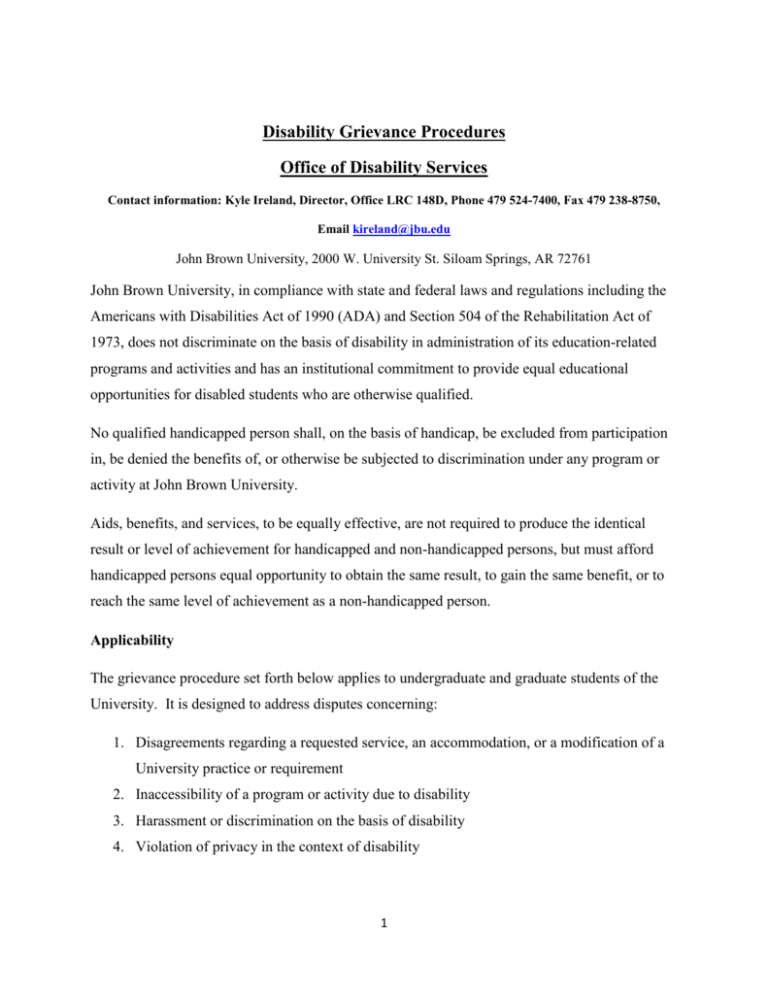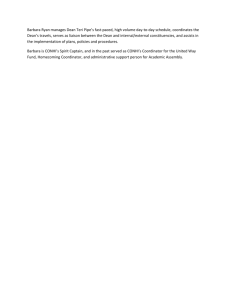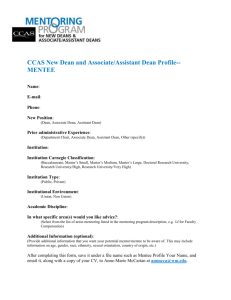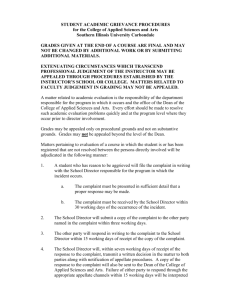Disability Grievance Procedures Office of Disability Services
advertisement

Disability Grievance Procedures Office of Disability Services Contact information: Kyle Ireland, Director, Office LRC 148D, Phone 479 524-7400, Fax 479 238-8750, Email kireland@jbu.edu John Brown University, 2000 W. University St. Siloam Springs, AR 72761 John Brown University, in compliance with state and federal laws and regulations including the Americans with Disabilities Act of 1990 (ADA) and Section 504 of the Rehabilitation Act of 1973, does not discriminate on the basis of disability in administration of its education-related programs and activities and has an institutional commitment to provide equal educational opportunities for disabled students who are otherwise qualified. No qualified handicapped person shall, on the basis of handicap, be excluded from participation in, be denied the benefits of, or otherwise be subjected to discrimination under any program or activity at John Brown University. Aids, benefits, and services, to be equally effective, are not required to produce the identical result or level of achievement for handicapped and non-handicapped persons, but must afford handicapped persons equal opportunity to obtain the same result, to gain the same benefit, or to reach the same level of achievement as a non-handicapped person. Applicability The grievance procedure set forth below applies to undergraduate and graduate students of the University. It is designed to address disputes concerning: 1. Disagreements regarding a requested service, an accommodation, or a modification of a University practice or requirement 2. Inaccessibility of a program or activity due to disability 3. Harassment or discrimination on the basis of disability 4. Violation of privacy in the context of disability 1 Informal Resolution In the event a student believes(i) that he or she has been denied an accommodation or the modification of a University practice or requirement to which he or she is entitled under applicable disability law or (ii) a program or activity has been inaccessible to him/her due to disability or (iii) he/she has been harassed or discriminated against because of a disability or perception of a disability by a college faculty or staff member or (iv) his/her privacy has been violated in the context of his/her disability, the student shall attempt to resolve the matter informally. If the student is unable to resolve the matter through the informal process, a formal complaint may be filed at the option of the student. In cases where the grievance involves the Director of Disability Services, a student may bypass the informal resolution process and move directly to a formal complaint. Formal Complaint If the informal procedure described above does not yield a successful resolution, the student may file a formal complaint in the following manner: 1. When To File A Complaint – Complaints shall be filed within seven (7) calendar days of the end of the informal resolution process described above. 2. Where To File A Formal Complaint - The complaint shall be filed with the appropriate Academic Dean (if the complaint concerns academics) or the Associate Dean of Students (if the complaint concerns a non-academic area). 3. Notice Of Receipt – Upon receipt of the complaint, the Academic Dean/Associate Dean will review the complaint for timeliness and appropriateness for this grievance procedure, and will provide the student with written notice acknowledging its receipt. 4. Investigation/Hearing – The Academic Dean or his/her designee shall initiate an investigation within fourteen (14) calendar days of receiving the complaint unless unusual circumstances prohibit it. The Academic Dean/Associate Dean may take appropriate action on an interim basis, when there is reasonable cause to believe that such action is needed for the health, safety, or welfare of the student or other member of the University community, or to avoid disruption to the academic process. In undertaking the investigation, the Academic Dean/Associate Dean may interview, consult with and/or 2 request a written response to the issues raised in the complaint from any individual he/she believes to have relevant information, including faculty, staff and students. The student and any person towards whom the complaint might have been directed shall have the right to submit written materials to the Academic Dean/Associate Dean and suggest names of any faculty, staff, students or others from whom he/she believes the Academic Dean/Associate Dean should hear. 5. Representation – The student and the person towards whom the complaint has been directed shall have the right to be represented at the hearing by the advocates or their choice. Since the hearing is administrative, not judicial in nature, the advocates may not by lawyers. 6. Findings and Notification – Upon completion of the investigation, the Academic Dean/Associate Dean of Students will prepare a final report containing a summary of the investigation, written findings and a proposed disposition. He/she will then transmit the report to the student and the party against whom the grievance is directed. The report should be submitted within fifteen (15) calendar days of the date the Academic Dean/Associate Dean first initiates the investigation unless prohibited by unusual circumstances. 7. Disposition – The Academic Dean/Associate Dean of Students shall take whatever actions are deemed appropriate (see Remedies section below). He/she shall report his/her decision in writing to the student, the Director of Disability Services and all other relevant parties. Remedies Possible remedies under this grievance procedure include corrective steps to reverse the effects of discrimination or end harassment, and measures to provide a reasonable accommodation or proper ongoing treatment. The guidelines set forth in the Faculty and Employee Handbooks will be adhered to in the event that corrective steps or actions are necessary. 3 Appeal Within ten (10) calendar days of the issuance of the final report, the student or the party against whom the grievance is directed may file an appeal to the Vice President for Academic Affairs (for academic grievances) or to the Vice President for Student Development (for non-academic grievances). The written request must specify the particular substantive and or procedural basis for the appeal, and must be made on grounds other than general dissatisfaction with the disposition. Furthermore, the appeal must be directed only to issues raised in the formal complaint ad filed or to procedural errors in the conduct of the grievance procedure itself and not to new issues. The review by the Vice President for Academic Affairs/Vice President for Student Development or his/her designee normally shall be limited to the following considerations: Were the proper facts and criteria used to make the decision? Were any extraneous facts or criteria used to make the decision? Were there any procedural irregularities that substantially affected the outcome? Given proper facts, criteria, and procedure, was the decision one that might be reasonably made? A copy of the Vice President’s written decision will be expected within thirty (30) calendar days of the filing of the appeal and shall be sent to the appropriate parties. The Vice President for Academic Affairs/Vice President for Student Development for good cause may extend the deadline. The decision of the Vice President of Academic Affairs/Vice President for Student Development on the appeal is final. Developed 9-9-03 Approved 11-13-03 Revised 10-2009 4 5









